Terrors of the imagination
Paul Binding
THE BEACON by Susan Hill Chatto, £10, pp. 154, ISBN 9780701183400 ✆ £8 (plus £2.45 p&p) 0870 429 6655 Of the four Prime siblings of the Beacon farm, Frank, the second boy, was, throughout their early lives, ‘almost invisible’. He did everything late, spent most of his time alone, and was a dunce at school, where he bemused teachers and children alike.
They never knew what to make of Frank, they said; what went on in Frank’s head was one of the great mysteries. He did little speaking but a great deal of staring out of large green-grey, slightly bulbous eyes. He followed people too ... Turn round, and Frank would be there, silent, watching, following.
Beware of the individual close to you whom you have never got to know, whose mental life you have written off as ‘mysterious’. For when Frank leaves the Beacon, indeed quits the north of England altogether, he discovers and projects a personality utterly dissimilar to that ascribed to him by his brother and two sisters, one wary of neither the external world nor interior depths. Frank becomes a London journalist who refuses to confine his talents to newspapers. No, he must write a book, and when he does, it is a huge success, with many spin-offs. Its subject? His early life at the Beacon, which apparently he loathed. As depicted by him, it was a set-up eminently worthy of loathing, a scene of compound, continuous, deliberate cruelty.
Frank’s book, we initially feel, is pathological, morbid distortion harnessed to literary fashion (this is the period of Angela’s Ashes). We ourselves know his brother and sisters; they are utterly incapable of the acts accorded them. Brother Colin, who went into farming and was a husband and father young, is called by a close relative ‘the kindest man on earth’. Younger sister, Berenice, if somewhat spoilt and self-centred, is no sadist, and as for May, who stands at the centre of this deftly worked, deeply moving novel, her dignified passivity completely disqualifies her for any misdeeds to her brother. And yet...? Why does Frank’s book so touch a nerve in his family?
The Beacon opens with May, who, for 27 years, has lived on this remote farm without her siblings, confronting her widowed mother’s dead body. Born in spring 1942, the cleverest of the four, May has led a life of dutiful devotion that strikes us as anachronistic. Beautifully, Susan Hill cuts her narrative between presentation of May’s sad present, the sadder for the vista it enforces of her future, and her past, in prose so limpid that it is only on reflection we appreciate just how troubling is the history unfolded. Naturally, an intelligent girl like May, intellectually curious, hard-working, tries successfully for university. But once she is in London something goes wrong. At first her sense of alienation can be put down to a country girl’s unfamiliarity with a big city, to the strain of a new regimen. But then ‘the terrors’ come, appalling transmogrifications of people and places. And these terrors are victorious and determine the rest of May’s life.
As a bereaved woman with the funeral to think about, she determines that Frank, who has so calumniated the family, should not even be informed of their mother’s death. But he does learn of it, and he and May, in spite of everything, meet. And we have to ask ourselves: bearing in mind May’s strange experiences, does Frank’s book tell a truth after all? Is there a connection between his literary distortions and his sister’s psychic ones?
The novel describes an arc, its end standing in telling relationship to its opening while eschewing closure. It is a profound achievement, psychologically and existentially penetrating, both satisfying and challenging in design, a worthy companion to its author’s earlier masterpieces, Strange Meeting and The Bird of Night. q










































































 Previous page
Previous page